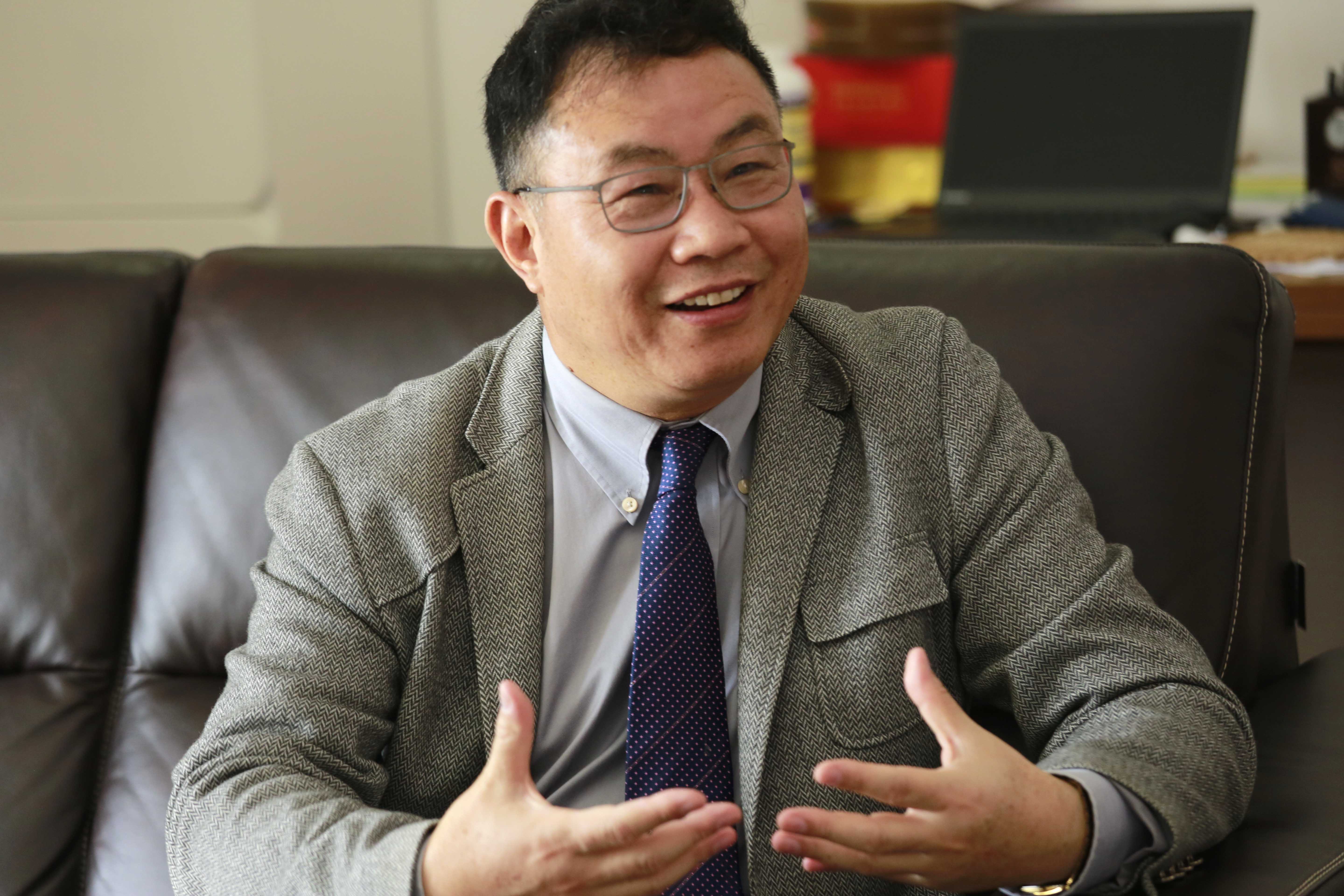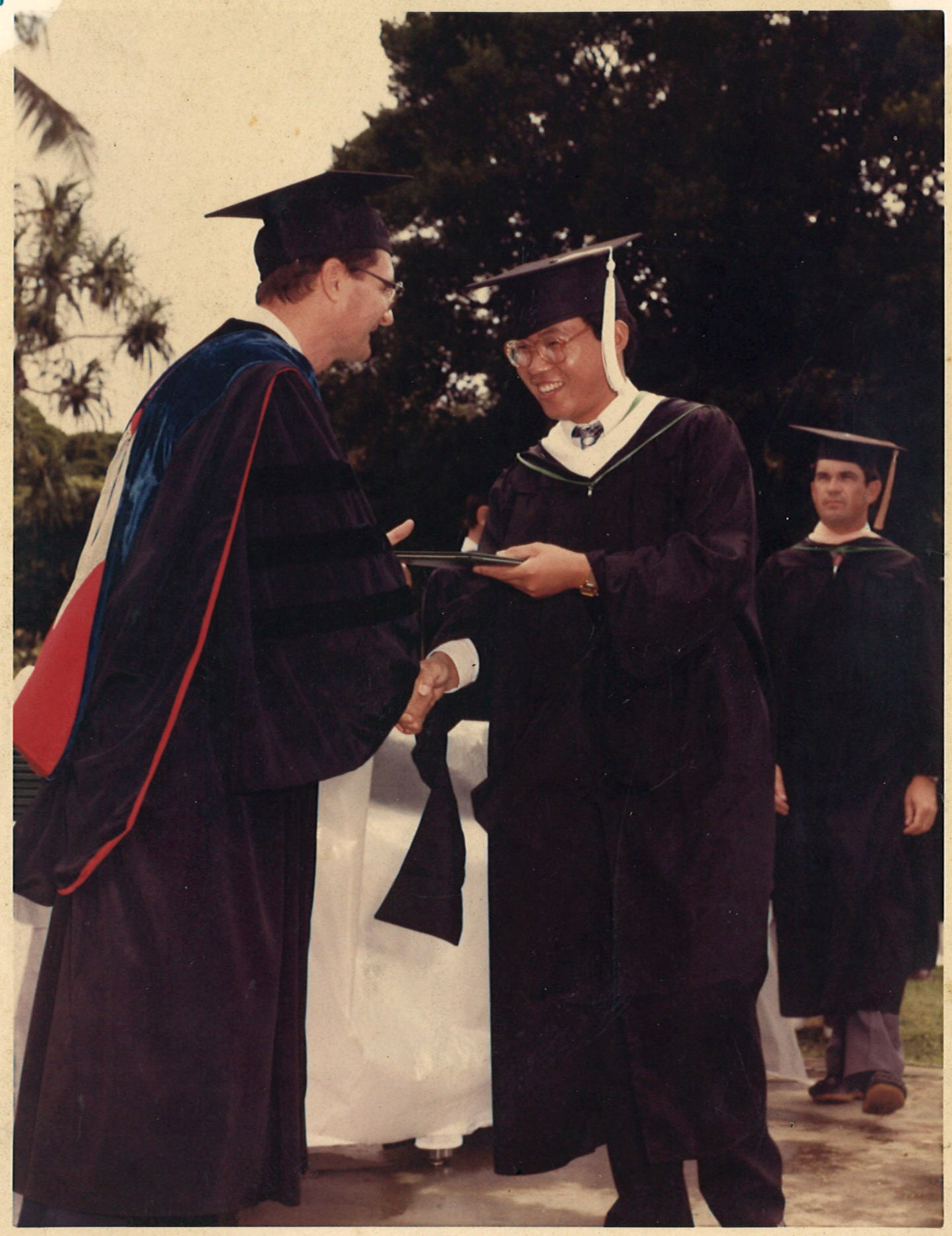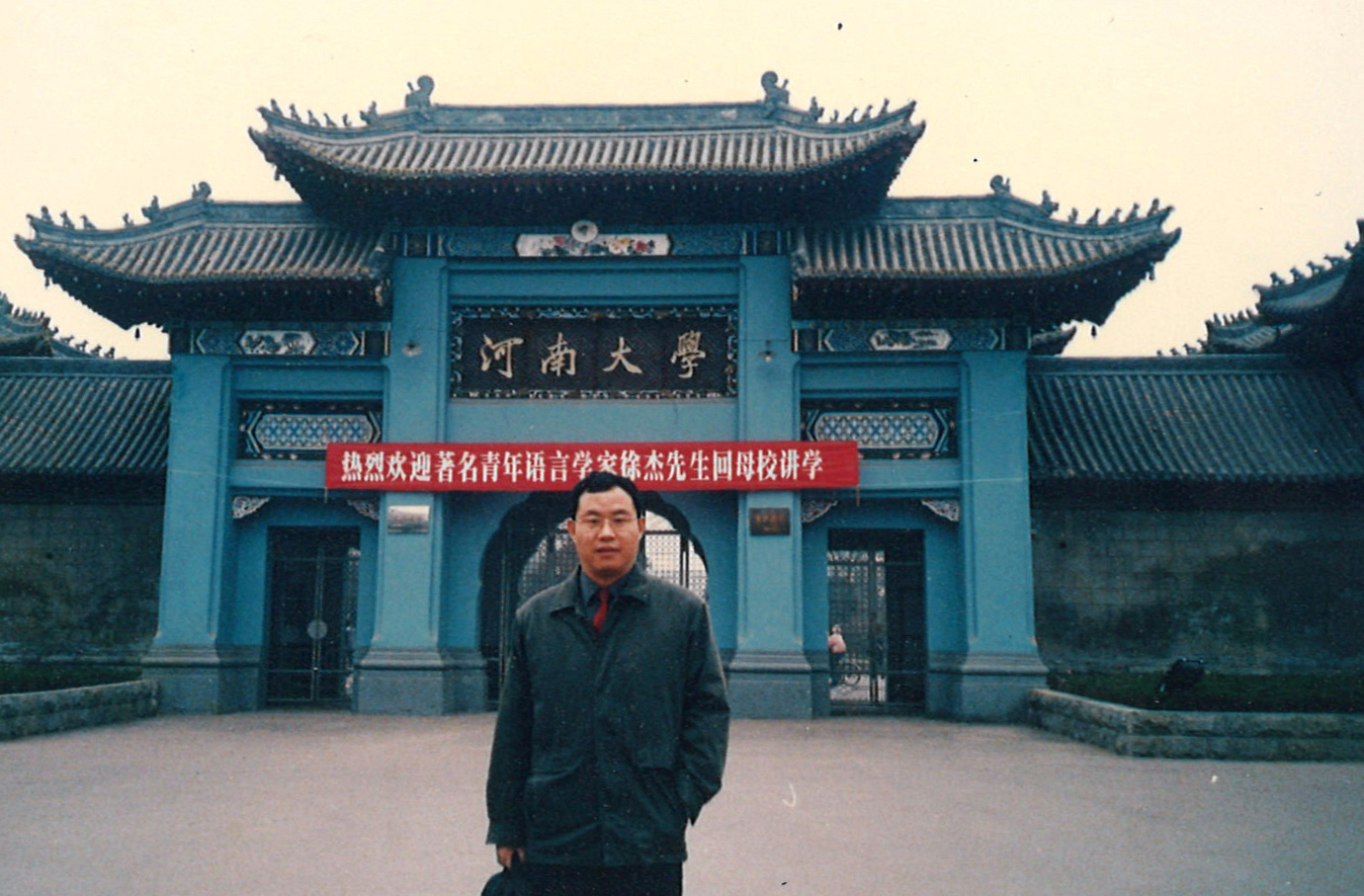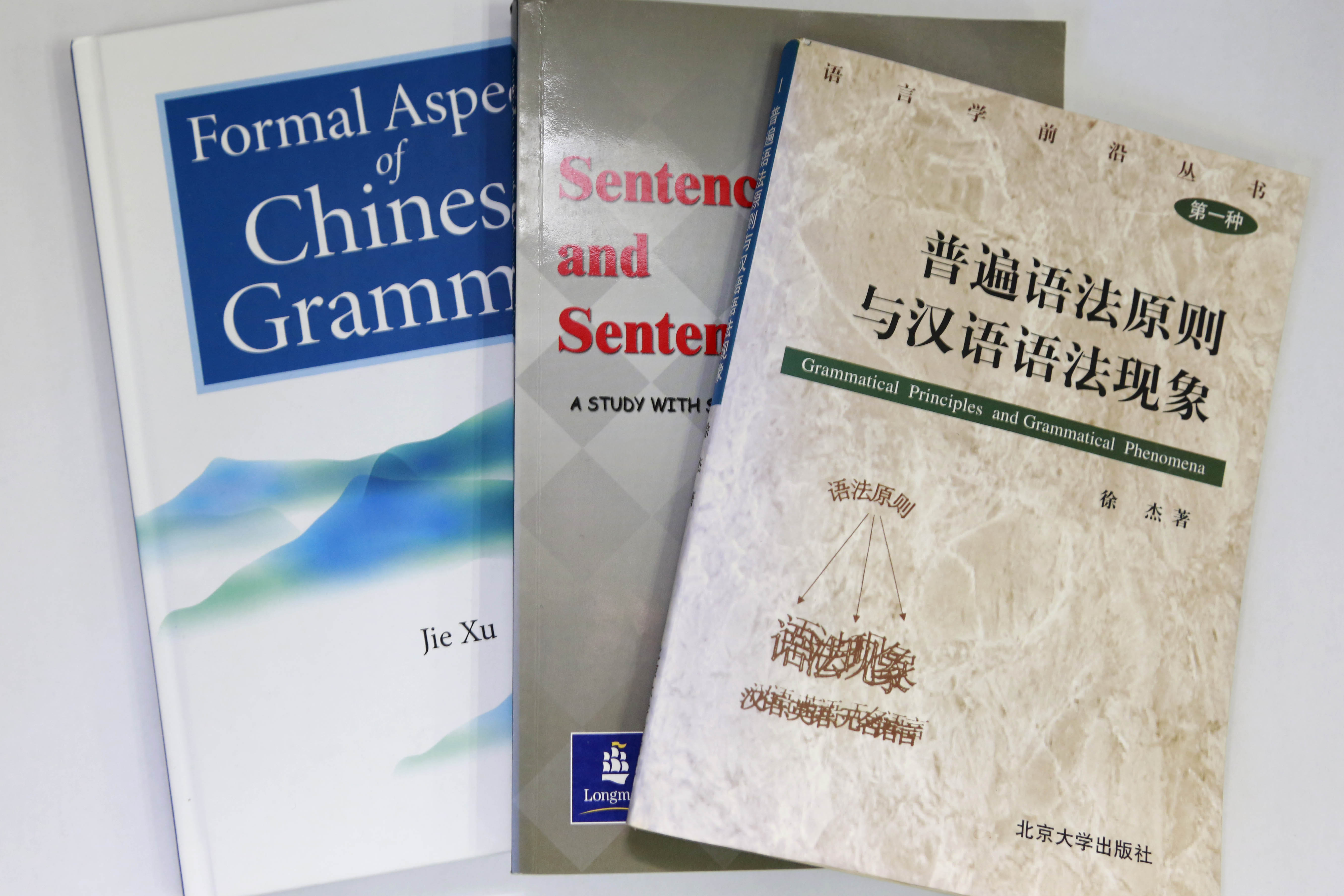Source: umagazine
In the flush of youth, many are consumed by their personal dreams. But with the passage of time, and the inevitable change of environment, that red-hot heart of youth invariably cools and gets buried in the routines of life. But such is not the case with a scholar, who, over a span of more than three decades, ploughs ahead uncompromisingly in his scholarly pursuits. You will find him on a campus in full bloom, a Chang Jiang Scholar Chair Professor that brightens the University of Macau (UM), a towering figure in Chinese linguistics. His mental landscape is lucid and boundless, his faith unchanging. He is the head of the Department of Chinese Language and Literature at UM, Prof Xu Jie.
A Living Language Museum
In Prof Xu’s living room, covered wall to wall with books, a cup of steaming Starbucks coffee awaits. He may be a university professor, but every fiber of his being is alive with a sense of humour, bubbling with irrepressible warmth. He wears his scholarship lightly, his sense of joie de vivre oozing from every pore in his body.
Xu was admitted to Henan University at the precocious age of 15, after passing the national college entrance examination that was restored after the Cultural Revolution. This was eventually followed by a doctoral degree from the Department of Linguistics, University of Maryland. Later, he joined the National University of Singapore as a faculty member.
Having lived overseas for more than 20 years, Xu returned to China in 2008 and began his teaching and research career in Macao. ‘I have come full circle. My overseas experiences have opened my eyes to what’s good about the West, but I am now more acutely aware that there are many good things about our own language and culture that are worth studying and preserving,’ he says. ‘At first I looked at the world from within China, and then I looked at China from the outside. It’s like admiring a mountain after you get out of it. I hope we can study our Chinese language and the various dialects within the context of all the human languages in the world. Macao is tiny, but over the past few hundred years, different languages, cultures, and ethnic groups have co-existed and influenced one another in Macao. Many languages are spoken here, including Mandarin Chinese, Portuguese, English, Cantonese, and Hokkien. That’s why I say Macao is a living language museum and a natural language lab.’
Why does the professor call Macao a living language museum? He has a graphic, if somewhat exaggerated, example to prove his point: ‘If you go to San Ma Lo and curse in any language, someone would curse you back in the same language right away. We must make good use of this living museum and natural lab. This will not only allow Macao to contribute to the world in linguistic studies, it will also help us to know and improve ourselves.’
Slow and Steady Wins the Race
Xu is a curious anomaly in the way he publishes articles. He never obsesses about publishing in the so-called key journals or English journals, although his articles do often end up in these learned publications because of their high quality. When deciding the language of his papers and where to submit them, his first consideration is which journal has the readership for whom the paper would provide the greatest value, and which language the said readership is accustomed to reading. He is also extremely meticulous and slow in producing papers. ‘Some might say they couldn’t afford the luxury of writing so slowly, and I was mentally prepared to pay the price for indulging in my own idiosyncrasy,’ he says. ‘But I believe sometimes to lose is to gain. Slow and steady wins the race. Scholarship is all about quality. I’d choose quality over quantity any day.’
Xu was pleasantly surprised when he was elected Chang Jiang Scholar Chair Professor earlier this year. ‘The competition for this prestigious title is cutthroat,’ he says. ‘Given my idiosyncrasy, I never thought I would earn the approval of so many famous scholars. This shows that even in a restless world, quality weighs heavily on the human heart.
Explaining Complicated Concepts in Simple Language
At first blush, linguistics seems boring. But Prof Xu’s classes always leave his students hanging on his every word. What is his secret? ‘Two things. First, I try to explain complicated concepts in simple language. Second, I try to help students see beyond the obvious,’ he says. ‘There is a whole universe in a tiny drop of water or a grain of sand.’
In the field of humanities and social sciences, linguistics enjoys a unique and important status. To use Prof Xu’s words, ‘Of all the skills within the grasp of mankind, language skills are the most important. If you have excellent language skills, then you won’t be a slouch at other skills.’ Prof Xu’s main research interests include grammatical theory, language education, language planning, and linguistic ‘special zone’. According to him, traditional language planning is conducted only at the national and regional levels, which he believes is not enough. Instead, he suggests extending the scope of language planning to include families and individuals. He also points out that there are linguistic ‘special zone’, areas where one can legitimately break linguistic rules. He believes that systematic and in-depth studies of such ‘special zone’ has both theoretical significance and practical value. Speaking of the new education concept that advocates Chinese-English bilingualism, he suggests guiding the implementation of this new concept at theoretical and technical levels, so as to liberate hundreds of millions of young students from the shackles of endless drills and allow them to devote the best years of their lives to more worthwhile activities.
Telling Macao’s Story in a Language the World Understands
In August 2017, Xu assumed office as the head of UM’s Department of Chinese Language and Literature for the second time. Having been reappointed to the same position he served seven years ago, Xu now has a brand-new vision for the department’s future.
Chinese is one of the key disciplines that sit high on UM’s academic agenda, deservedly so as the Chinese department has a strong faculty team and high academic standards. ‘Chinese departments around the world can be broadly divided into two categories. There are those Chinese departments or China studies institutes at Western universities, and then there are Chinese departments in mainland
China. Studies conducted at the former are called “sinology”, while those conducted at the latter are called national literary studies,’ he says. ‘Both Hong Kong and Macao are special administrative regions in China, which means they are part of China but they are physically outside of mainland China. Therefore, our Chinese department doesn’t fall into either of the two categories. But we must combine the strengths of both and develop our own characteristics. Specifically, our academic stance is: “rooted in China, oriented towards the world.” We should conduct case studies in Chinese language and literature from a Chinese perspective, within the world’s mainstream theoretical framework in humanities and sciences. In other words, we must tell the stories of China and Macao in a language the world understands .’
Creativity and Craftsmanship
As an accomplished scholar, Prof Xu believes that two traits are very important for scholars. One is creativity, and the other is care for craftsmanship. ‘Creativity is about building on what others have done, blazing a new trail, seeing the big picture, and looking beyond the surface. In other words, it is the ability to see problems that escape other people who are blinded by their familiarity with the subject, as well as the ability to find solutions where others see none, ‘ he says. ‘ The craftsman’s care means you have to turn your hard-earned results into academic products. You must pour every last ounce of your talent and energy into it, so you can give society nothing less than your best. Together, these two things will spell a perfect academic life.’
‘Over the years, my experience is: life needs to be planned, and opportunities need to be seized,’ says Xu. ‘You must have a clear idea of your strengths and weaknesses so you can play to your strengths. You must also set realistic life goals—goals that are slightly out of reach but attainable if you stretch for them. In other words, don’t set your goals too high or too low. Of course, your final goals and the way to achieve them may not be exactly the same as what you planned, but the initial goals and your subsequent effort will play a crucial role in achieving your final goals. ’




